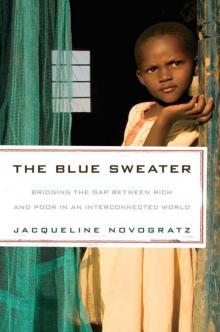The Blue Sweater: Bridging the Gap Between Rich and Poor in an Interconnected World 

Genre: Other4
Published: 2009
View: 2787
Read OnlineRead The Blue Sweater: Bridging the Gap Between Rich and Poor in an Interconnected World Storyline:
The Blue Sweater is the inspiring story of a woman who left a career in international banking to spend her life on a quest to understand global poverty and find powerful new ways of tackling it. It all started back home in Virginia, with the blue sweater, a gift that quickly became her prized possession—until the day she outgrew it and gave it away to Goodwill. Eleven years later in Africa, she spotted a young boy wearing that very sweater, with her name still on the tag inside. That the sweater had made its trek all the way to Rwanda was ample evidence, she thought, of how we are all connected, how our actions—and inaction—touch people every day across the globe, people we may never know or meet.From her first stumbling efforts as a young idealist venturing forth in Africa to the creation of the trailblazing organization she runs today, Novogratz tells gripping stories with unforgettable characters—women dancing in a Nairobi slum, unwed mothers starting a bakery, courageous survivors of the Rwandan genocide, entrepreneurs building services for the poor against impossible odds. She shows, in ways both hilarious and heartbreaking, how traditional charity often fails, but how a new form of philanthropic investing called "patient capital" can help make people self-sufficient and can change millions of lives. More than just an autobiography or a how-to guide to addressing poverty, The Blue Sweater is a call to action that challenges us to grant dignity to the poor and to rethink our engagement with the world.From Publishers WeeklyNovogratz combined her twin passions for banking and philanthropy after she left a lucrative corporate banking position to work with women's groups in microfinance, the pioneering banking strategy that won Muhammad Yunus a Nobel Peace Prize in 2006. Her work merging market systems with development and social empowerment led her to create the Acumen Fund for entrepreneurs in developing nations, which she describes as the opposite of old-fashioned charity. Novogratz also focuses on her own developmental path as she charts her evolving views of capitalism and how she will change the world. Unfortunately, she stumbles when she strays into biographical territory, relying on clichés to bolster her professional decisions through a personal lens. The book is most interesting when it touches on the difficult decisions that Novogratz and her team must make about financial empowerment—should they charge interest on loans to poor women? can working women find acceptance in a patriarchal society?—but these dilemmas are facilely glossed, keeping the book in an uncomfortable limbo between a personal narrative and a primer on globalization. (Feb.) Copyright © Reed Business Information, a division of Reed Elsevier Inc. All rights reserved. From BooklistAcumen Fund founder Novogratz blends two narratives in this memoir about her years fighting global poverty. In one thread, she recounts her early experiences in Africa developing microfinance organizations to assist women. Many of her reminiscences focus on relationships with the local women in government who were key to her success as well as the personal trials she encountered matching her Western vision with their ideas about the future. She also writes about later work in India and Pakistan. The other thread focuses on her return to Rwanda after the genocide. Although her inside view of global poverty initiatives and politics at the most basic level makes for interesting reading, her personal story intrudes in a manner that some readers may find self-serving. Her reflections on the genocide also detract from the economic discussion in India and Pakistan, rendering the book more Rwanda-centric (and thus more political) than she may have intended. In the end, Novogratz does provide enough information on microfinance to make readers curious to learn more. --Colleen MondorPages of The Blue Sweater: Bridging the Gap Between Rich and Poor in an Interconnected World :